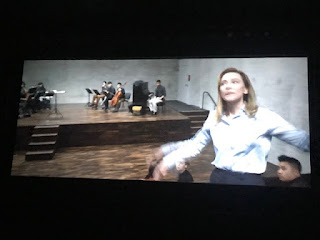All I knew of Todd Field's Tár (2022) was what I saw of its intense, Cate Blanchett-driven trailer; that Zadie Smith wrote about it; and that if I ever saw the film, I would make a point of reading Smith's review.
Yesterday I finally saw Tár and was delighted with myself for knowing enough of Mahler's life and his symphonies to despair that everything I'd read about the film (except for Zadie Smith's review, so far), missed the fact that it could be read through the "Funeral March" that opens Mahler's 5th with Leonard Bernstein's morbidly slow "Adagio" that closes his 9th (morbidly slow in the way Franz Kafka's killing machine from "In the Penal Colony" is morbidly slow).
Of course Lydia Tár (nee Lynda) would appreciate that, just as her diffident Juilliard student and her equally Millennial cellist wouldn't give a toss. On that note, who would self-identify as BIPOC ("As a BIPOC pangender person ..." -- is he saying he is Black, Indigenous and a Person of Colour?), and what Millennial cellist could be expected to have heard -- or more to the point, have seen -- Jacqueline du Pré's performance of Elgar's Cello Concerto from any other source but YouTube?
As for Blanchett's "death", why is it set in a "developing" nation like Thailand, if not to suggest that a death in Thailand is more tortuous for being set there -- as opposed to Venice, where Mahler's 5th provided Visconti's film version of Thomas Mann's Death in Venice its score?
Lydia Tár is just as narcissistic and, to use her own term, "robotic" as her students and her symphony orchestra's young ("fresh meat") cellist. But Western classical music is a personality too, no? So what's all the fuss? This film is so not "about" what people keep saying it is. It just isn't, is it?

I cannot help but think of Medusa when I think of Lydia Tár in this phenomenal movie. D
ReplyDelete